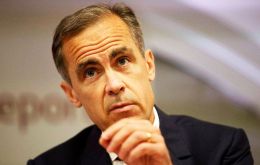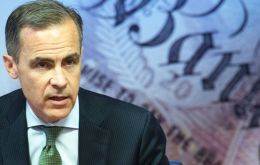MercoPress. South Atlantic News Agency
Tag: UK interest rates
-
Friday, December 16th 2016 - 10:44 UTC
Bank of England leaves rates unchanged: global outlook has become more fragile

The Bank of England voted unanimously on Thursday to keep the UK's main interest rate at a record low of 0.25%, and anticipated that the next rate move could be in either direction. The last change was a rate cut in August, in the wake of the UK's vote to leave the EU.
-
Saturday, November 5th 2016 - 09:49 UTC
Bank of England raises inflation and growth forecasts, but Brexit uncertainty remains

The Bank of England has raised its near-term growth and inflation forecasts on Thursday following the slide in sterling seen since the U.K.'s decision to leave the European Union. The bank decided Thursday to keep interest rates at the record low level of 0.25% and maintan its quantitative easing (QE) purchase targets at up to £10 billion for corporate bonds and £435 billion for U.K. government bonds.
-
Friday, September 16th 2016 - 07:06 UTC
Bank of England rates remain at record low, but could be further cut

The Bank of England said on Thursday it was still likely to cut interest rates to just above zero later this year, even though the initial Brexit hit to Britain's economy would be less severe than it expected only last month. The Bank said its nine rate-setters were unanimous in their decision to keep Bank Rate at its new record low of 0.25%, the lowest in the BoE's 322-year history.
-
Saturday, August 8th 2015 - 08:22 UTC
Bank of England keeps rates unchanged; little talk of rise because of China and Greece

UK interest rates have been held at 0.5% again by the Bank of England's Monetary Policy Committee (MPC). Members voted 8-1 to keep rates on hold - the first time for months the decision has not been unanimous, with Ian McCafferty voting for an increase.
-
Friday, March 6th 2015 - 07:06 UTC
UK leaves interest rates unchanged at record low 0.5% for six years

UK interest rates have been kept unchanged again by the Bank of England, meaning they have now been at their record low of 0.5% for six years. Rates were first cut to 0.5% in March 2009 as the Bank sought to lift economic growth amid the credit crunch.
-
Friday, April 11th 2014 - 04:22 UTC
Bank of England leaves interest rates unchanged as UK recovery picks up

UK interest rates have been held at their record low of 0.5% for another month by the Bank of England. On Thursday the Bank also kept the size of its bond-buying stimulus program unaltered at £375bn. No changes had been expected to either rates or the bond-buying measure, despite recent evidence that the UK economy is continuing to recover.
-
Thursday, March 24th 2011 - 06:32 UTC
Bank of England remains divided 6 to 3 on interest rate hike

Six members of the Bank of England’s nine-strong Monetary Policy Committee, including Governor Mervyn King, continued to oppose the minority campaign for an immediate rise in benchmark UK interest rates at the MPC’s meeting two weeks ago, minutes revealed Wednesday.
